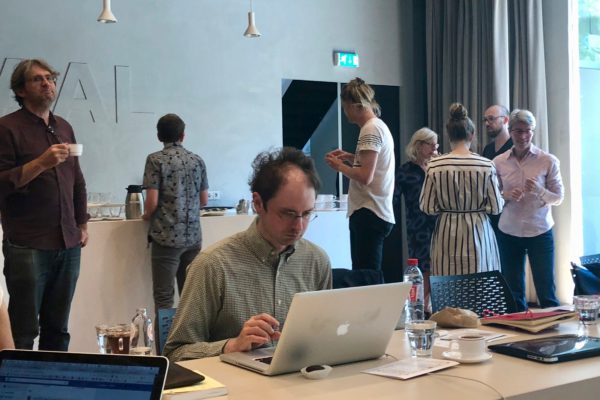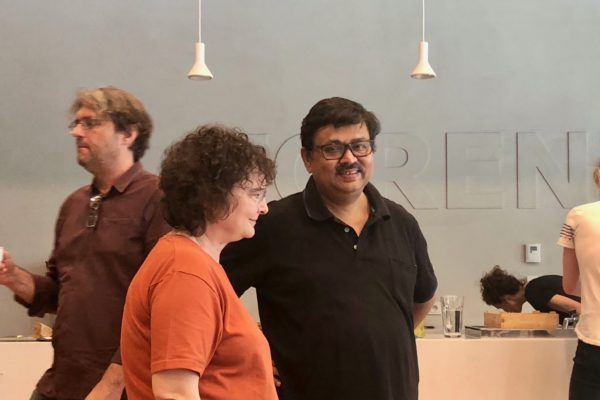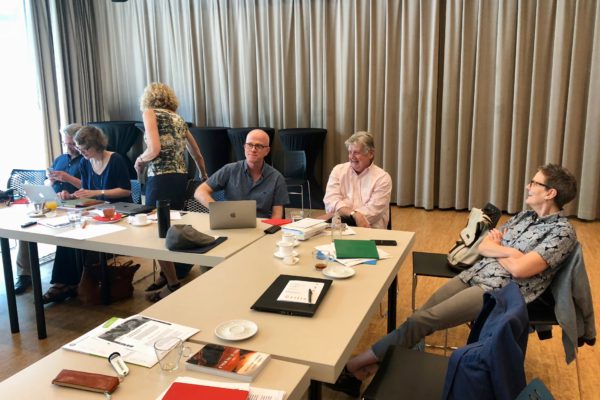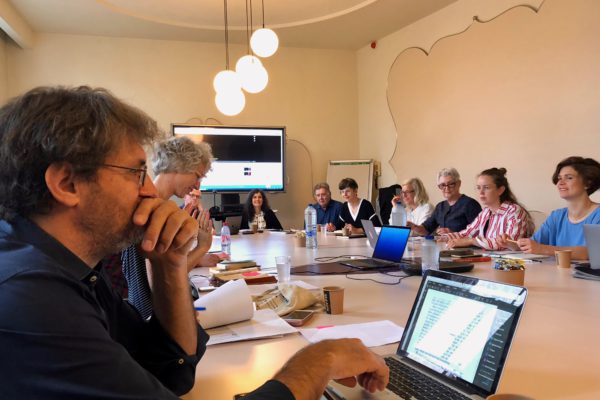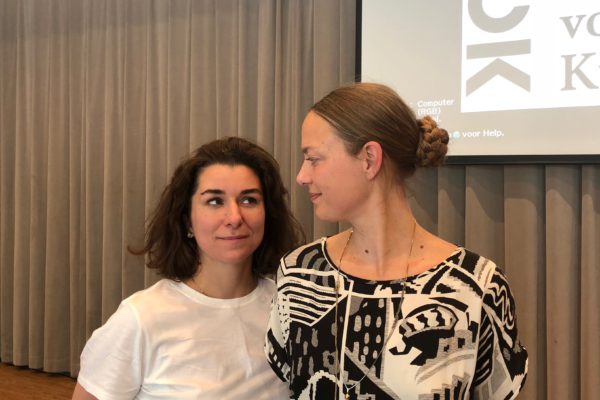This meeting focused on questions arising for critique in relation to technology and technicity. If we take today’s reality as deeply informed by and brought to life within technological living, then any concern for technology is implicated in – directed at or within the horizon of – the technologized ecologies currently at play planetarily, and the modes of human/non-human coexisting they (do not) generate. Our meeting tried to navigate with care the ambivalent challenges that “technology” and/as “critique” or “critique” and/as “technology” pose.
We held two days of discussion (day one focusing on ‘technology’, day two on ‘technē’) on the basis of joint readings:
- Gilbert Simondon, On the Mode of Existence of Technical Objects, translated by Cécile Malaspina and John Rogove. Minneapolis: Univocal Publishing, 2017 [1958] (selection).
- Déborah Danowski and Eduardo Viveiros de Castro, The Ends of the World, translated by Rodrigo Nunes. Cambridge: Polity Press, 2016.
- John Tresch, ‘Anthropotechnics in the Anthropocene,’ 2016.
This workshop was funded by the NWO Aspasiapremie and received generous financial support from the European University Viadrina, Hong Kong University, Leuphana University, Penn State University, the University of New South Wales, The Ohio State University and the University of Amsterdam.
Mercedes Bunz (University of Westminster)
Anirban Das (Centre for Studies in Social Sciences Calcutta)
Kári Driscoll (Utrecht University)
Magda Górska (Utrecht University)
Ingrid Hoofd (Utrecht University)
Birgit M. Kaiser (Utrecht University)
Vicki Kirby (University of New South Wales)
Holger Kuhn (Leuphana University)
Leonard Lawlor (Penn State University)
Susanne Leeb (Leuphana University)
Jacques Lezra (University of California, Riverside)
Oona Lochner (Leuphana University)
Cécile Malaspina (Royal College of Art)
Florencia Malbran (New York University)
Sam McAuliffe (Goldsmiths, University of London)
Timothy O’Leary (Hong Kong University)
Esther Peeren (University of Amsterdam)
Subro Saha (Utrecht University/Amity University)
Anne Sauvagnargues (University of Paris X, Nanterre)
Melanie Sehgal (European University Viadrina)
Beate Söntgen (Leuphana University)
Heiko Stubenrauch (Leuphana University)
Kathrin Thiele (Utrecht University)
Sybrandt van Keulen (University of Amsterdam)
Jennifer Wagner-Lawlor (Penn State University)
Lotte Warnsholdt (Leuphana University)
Shannon Winnubst (The Ohio State University)
9.30-10.00 Coffee
10.00-10.15 Welcome and opening
Birgit M. Kaiser and Kathrin Thiele
10.15-12.00 Technology Session I: Unthinking Technology
Guided by Mercedes Bunz and Cécile Malaspina
Simondon observes in the Mode of Existence of Technical Object that when turning to technology, we allow ourselves ‘to be carried away by primitive xenophobia’ (MOT 16). Following that, the aim of this session is to unthink technology. Being with technology has become the norm in today’s technical realities. It is all the more important to unthink technology’s link to capitalism and its ideology of efficiency in light of the concept of noise.
12.00-14.00 Lunch break
14.00-16.00 Technology Session II
Discussion
16.00-16.30 Coffee
16.30-18.00 Who Comes After The Anthropocene?
Public lecture by Vicky Kirby (UNSW)
As human agency and desire become geologically legible and the hubris of human l exceptionalism is roundly condemned it seems that the identity of “the subject,” “the-one-who-knows,” is no longer in question. The call to repair and care for our planet is leveraged in terms of who has harmed it, and being human is prerequisite to this accusation. And yet, what should we make of political bias in deep-learning algorithmic calculation and the agency of informational swarms, or mounting evidence of plant learning and memory and the finessed decisions and negotiations within vegetal socialities? Are these mere metaphors of descriptive licence, anthropocentric projections that can have no substantive cognitive or agential purchase? Can we continue to adjudicate culpability and responsibility with such certainty and conviction if evidence of “the subject” proves ubiquitous, dynamic, and morphologically surprising? My aim in this paper is to consider such questions with the help of non-concepts such as “originary writing,” “originary technicity” – indeed, “originary humanicity.”
18.00-19.00 Reception
9.30-10.00 Coffee
10.00-12.00 Technē Session I: Rethinking technē in technology
Guided by Melanie Sehgal and Timothy O’Leary
Tresch stresses a new urgency of technē and anthopotechnics in light of the “ends of the world”, resonating with Le Guin’s “we’ve got to change our minds”. How has the notion of technē been separated from technology in modern modes of thinking? And what can we learn from the classical Greek notion of technē to rethink techniques as new anthropotechnics in our technological epoch?
12.00-14.00 Lunch break
14.00-16.00 Technē Session II
Discussion
16.00-16.30 Reflections and closing
10.00-12.30 TC core team meeting – planning session
Future events and projects

